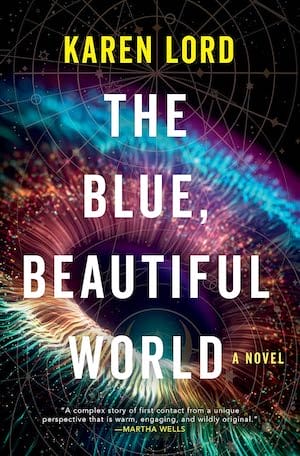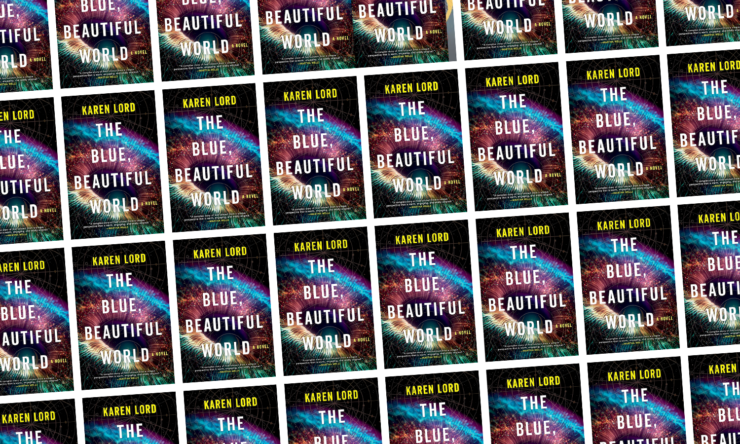It begins with a pop star—one who, in the grand tradition of Prince and Madonna, is known by a single name. His name is Owen, and he’s become a global player in the entertainment industry of the 22nd century society described in Karen Lord’s novel The Blue, Beautiful World and in realms that extend far beyond making music and venturing out on tour.
It’s clear from the opening pages of Lord’s novel that there’s more afoot here than simply intrigue among the rich and famous, though. The Blue, Beautiful World opens with a sentence that wouldn’t be out of place in a spy novel: “The emissary kept on digging his own grave, centimeter by centimeter, word by word.” And while the early pages of this book make it clear that Owen has interests in other matters, including his planned purchase of a soccer team, there’s a lot more than that afoot.
Gradually, Lord reveals the specifics of this futuristic world, including a reference to “the population collapse of the 2070s” and the presence of technologically advanced masks that allow several characters to transform their appearance. And from there, something else becomes clear: Owen isn’t just interested in maximizing his fame or business holdings on Earth—he’s also involved in establishing contact between Earth and interstellar civilizations. Except that his involvement in attempting to expand the planet’s horizons isn’t a universally beloved cause, and it’s put both Owen and his associates in danger.
About a third of the way into The Blue, Beautiful World, the novel’s focus shifts to Kanoa, a young man working for the Federated States of Polynesia and haunted by dreams of his departed father. Kanoa has been summoned to a group of thinkers and diplomats from around the planet—a convocation described as “a model global government.” Here, Kanoa and his colleagues embark on debates and simulations about what a global government of Earth might mean when interacting with interstellar civilizations.
Buy the Book


The Blue, Beautiful World
Kanoa and his colleagues hail from all over the world, but they have one common element. As Bay, one of his colleagues based on Morocco, points out:
“Through blood and beyond blood, we’re connected to places where Old World met New for the first time. Like Kanoa said from the beginning, we know about the genocide by disease and battle, and the colonization and exploitation after.”
There’s a lot going on here, and that’s before Lord also reveals that Kanoa’s memories of his father—who is presumed deceased under mysterious circumstances—also play a larger-than-expected role in the plot. It’s a novel that reckons with big ideas even as it constantly widens its scope, a largely admirable tendency that can also be dizzying.
Calling this “dizzying,” a word that can have both positive and negative connotations, is very intentional. I don’t love discussing a book’s marketing or packaging in the context of a review, but there are a few aspects about reading The Blue, Beautiful World that put that question into sharp relief. When you reach the end of this novel, you’ll get to Lord’s acknowledgments for the book, which includes mention of the years she spent in what she’s termed the “Cygnus Beta universe.” The acknowledgments section is followed by a guide to characters and locations referenced in the series—which includes this novel along with Lord’s earlier works The Best of All Possible Worlds and The Galaxy Game.
Here’s where things get trickier. Neither the promotional copy for this book (or at least the galley of it I read) made any mention of this being set in the same fictional universe as two of Lord’s previous books. Based on the information available at the time of my writing this review on Penguin Random House’s website and Goodreads—both of which are relatively comprehensive at stating when books are parts of larger series—I would assume that this was a standalone work of fiction.
There are certainly benefits for going into this novel cold; the fact that it begins as a tale of futuristic popular culture and corporate intrigue (à la William Gibson’s Idoru) and then shifts gears dramatically to reveal the actual stakes at hand is an impressive narrative zig-zag if you’re not expecting the full universal milieu to come into play here. But that aspect of it doesn’t quite come into focus until a third of the way through a novel of around 240 pages in length. This includes conflicts among multiple extraterrestrial factions, each with their own complex relationships with their colleagues and with Earth. To wit, this line of dialogue explaining the status quo:
“The Cygnians, the Austrinians, and the Cygnian Eridanians and their pilots are for us. Most of the Geminorians are for us, but that can be murky. One of the Lyran planets is on our side, but cartels in the rest of the Alpha Lyrae system have been steadily undermining and exploiting Earth for about two centuries. As for the Eridanians at Alpha Centauri…we don’t have a lot of information on them.”
This is catnip if you like your science fiction with plenty of political intrigue—but it’s also a lot to take in, and it makes the second half of The Blue, Beautiful World feel overcrowded if you’re coming into this expecting a fully detached work.
In the end, this criticism of Lord’s novel (or the marketing thereof) shouldn’t be confused for a dismissal of it. It’s an engaging work of speculative fiction, and both Owen and Kanoa are compelling characters. The big ideas Lord engages with here, especially the legacy of colonialism on a national level and how that experience can translate to engaging with civilizations on a planetary scale, are fascinating and thought-provoking.
In some ways, the altered climate and shifting geopolitics of this 22nd century Earth are far removed from the world we live in. The challenges that Lord’s characters face can feel more recognizable to contemporary readers; as one working to create a unified global government and broker intergalactic peace says, “if you go into this fixated on us and them, you have already lost.” It’s a phrase that works as a synecdoche for the novel as a whole—and it’s a message worth repeating.
The Blue, Beautiful World is published by Del Rey.
Tobias Carroll is the managing editor of Vol.1 Brooklyn. He is the author of the short story collection Transitory (Civil Coping Mechanisms) and the novel Reel (Rare Bird Books).










